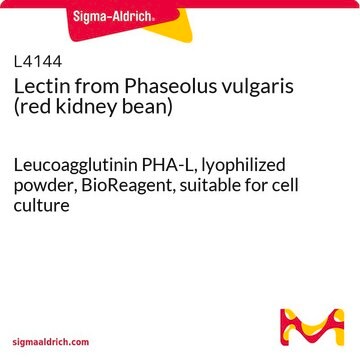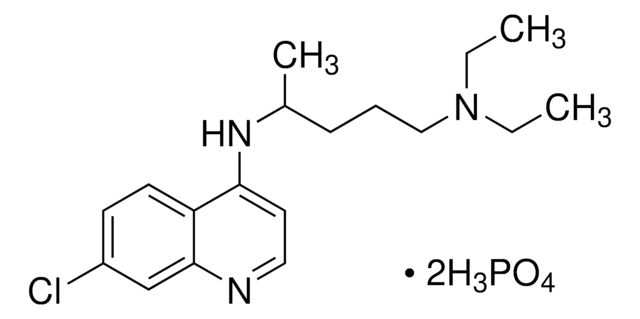415480
Chloroquine diphosphate salt
97%
Synonym(s):
N4-(7-Chloro-4-quinolinyl)-N1,N1-dimethyl-1,4-pentanediamine diphosphate salt
Sign Into View Organizational & Contract Pricing
All Photos(1)
About This Item
Empirical Formula (Hill Notation):
C18H26ClN3 · 2H3PO4
CAS Number:
Molecular Weight:
515.86
Beilstein:
4223142
EC Number:
MDL number:
UNSPSC Code:
12352100
Recommended Products
Assay
97%
SMILES string
OP(O)(O)=O.OP(O)(O)=O.CCN(CC)CCCC(C)Nc1ccnc2cc(Cl)ccc12
InChI
1S/C18H26ClN3.2H3O4P/c1-4-22(5-2)12-6-7-14(3)21-17-10-11-20-18-13-15(19)8-9-16(17)18;2*1-5(2,3)4/h8-11,13-14H,4-7,12H2,1-3H3,(H,20,21);2*(H3,1,2,3,4)
InChI key
QKICWELGRMTQCR-UHFFFAOYSA-N
Looking for similar products? Visit Product Comparison Guide
replaced by
Product No.
Description
Pricing
Choose from one of the most recent versions:
Already Own This Product?
Find documentation for the products that you have recently purchased in the Document Library.
Changkun Hu et al.
European journal of medicinal chemistry, 45(2), 705-709 (2009-12-01)
The purpose of this study was to evaluate the enhancement value of chloroquine analogs when used in combination with Akt inhibitors on the MDA-MB468, MDA-MB231 and MCF7 human breast cancer cell lines. The result showed that the combination of certain
Onyeka Onyeibor et al.
Journal of medicinal chemistry, 48(7), 2701-2709 (2005-04-02)
A series of analogues of cryptolepine (1) have been synthesized and evaluated for their in vitro antiplasmodial and cytotoxic properties. The IC(50) values of several compounds (11a, 11k-m, 11o, 13) against Plasmodium falciparum (strain K1) were <0.1 muM, 5-10-fold lower
Margaret A L Blackie et al.
Bioorganic & medicinal chemistry letters, 20(3), 1078-1080 (2009-12-26)
Synthesis of the potent antiplasmodial 4-aminoquinoline, phenylequine (PQ), is reported for the first time. PQ and the two analogues show increased efficacy in moving from the chloroquine sensitive D10 to the chloroquine resistant K1 strain in vitro. The in vivo
Gajanan Wanare et al.
Bioorganic & medicinal chemistry letters, 20(15), 4675-4678 (2010-06-26)
Both the lack of a credible malaria vaccine and the emergence and spread of parasites resistant to most of the clinically used antimalarial drugs and drug combination have aroused an imperative need to develop new drugs against malaria. In present
David J Bacon et al.
Antimicrobial agents and chemotherapy, 51(4), 1172-1178 (2007-01-16)
In vitro drug susceptibility testing with the malaria parasite has been used to assess the antimalarial activities of new compounds and to monitor drug resistance in field isolates. We investigated the validity of a SYBR green I fluorescent-based assay under
Our team of scientists has experience in all areas of research including Life Science, Material Science, Chemical Synthesis, Chromatography, Analytical and many others.
Contact Technical Service








